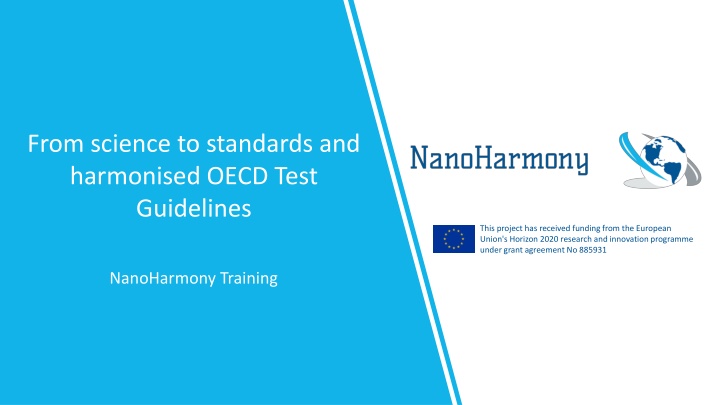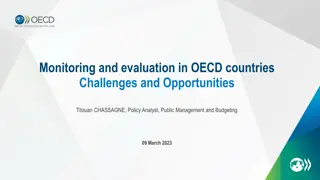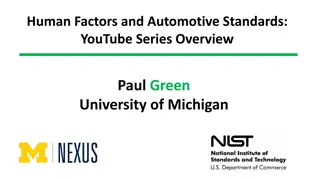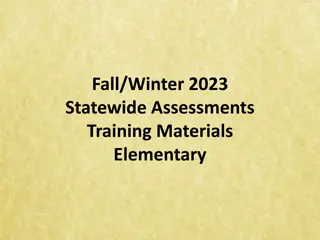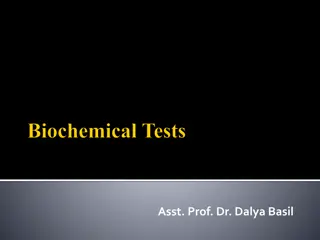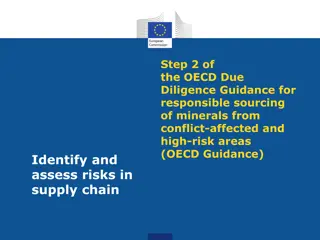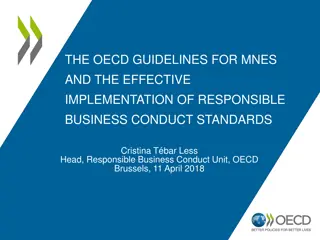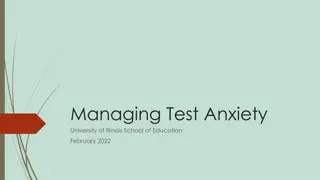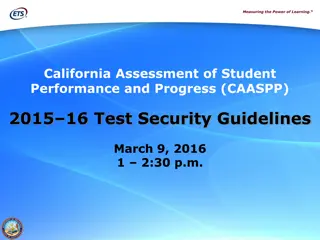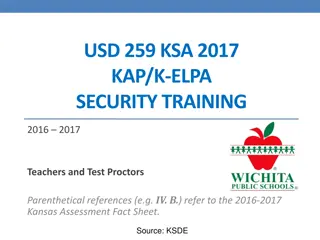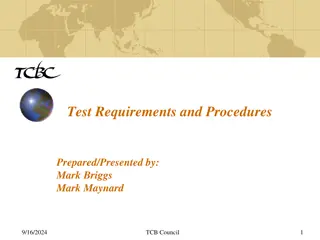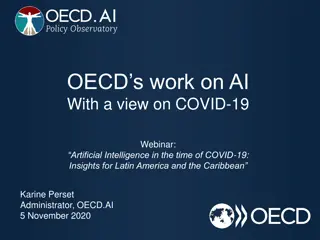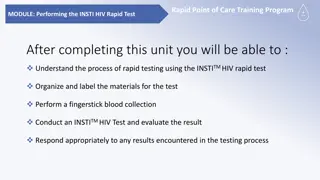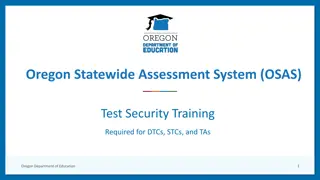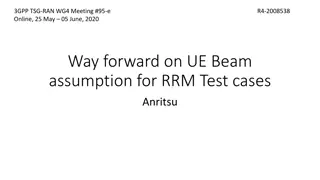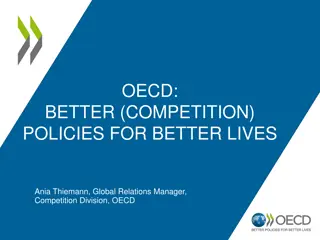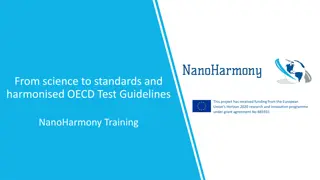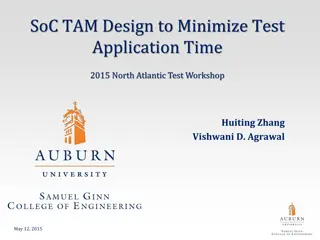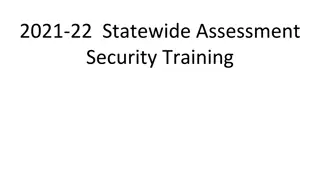NanoHarmony Training: Standards and OECD Test Guidelines
This project funded by the EU's Horizon 2020 program focuses on developing and validating test methods for OECD Test Guidelines. The training material provides essential information on topics such as harmonization of test methods, the role of OECD committees, and the process of OECD Test Guideline development. Learn about the importance of standardization, political structure of the OECD, stakeholder engagement, and more.
Download Presentation

Please find below an Image/Link to download the presentation.
The content on the website is provided AS IS for your information and personal use only. It may not be sold, licensed, or shared on other websites without obtaining consent from the author.If you encounter any issues during the download, it is possible that the publisher has removed the file from their server.
You are allowed to download the files provided on this website for personal or commercial use, subject to the condition that they are used lawfully. All files are the property of their respective owners.
The content on the website is provided AS IS for your information and personal use only. It may not be sold, licensed, or shared on other websites without obtaining consent from the author.
E N D
Presentation Transcript
From science to standards and harmonised OECD Test Guidelines This project has received funding from the European Union's Horizon 2020 research and innovation programme under grant agreement No 885931 NanoHarmony Training
Conditions of use The training material was developed within the project NanoHarmony (EU Horizon 2020 No. 885931). Attribution-NonCommercial 4.0 International (CC BY-NC 4.0): You are free to: Share copy and redistribute the material in any medium or format Adapt remix, transform, and build upon the material The licensor cannot revoke these freedoms as long as you follow the license terms. Under the following terms: Attribution You must give appropriate credit, provide a link to the license, and indicate if changes were made. You may do so in any reasonable manner, but not in any way that suggests the licensor endorses you or your use. NonCommercial You may not use the material for commercial purposes. No additional restrictions You may not apply legal terms or technological measures that legally restrict others from doing anything the license permits. From science to standards and harmonised OECD Test Guidelines
NanoHarmony The project Develop and validate Test Methods for OECD TGs/GDs The NanoHarmony legacy White Paper Training Material Formation of a network to interact with all relevant stakeholders Regular Online Workshops TGs and GDs for NMs Process Mentor Develop a structure to translate science into test methods used in regulation www.nanoharmony.eu + 18 int. assoc. partners From science to standards and harmonised OECD Test Guidelines
NanoHarmony Training: From science to standards and harmonised OECD Test Guidelines This set of slides provides a low-level entry into the topic of standards and harmonised OECD Test Guidelines and how science can contribute to this. The training set provides essential information on the topics of harmonisation of test methods, OECD and its relevant committees and documents, and the process of OECD Test Guideline development. This material was developed mid-2023. The Training Material is divided into 4 different modules, each focussing on a specific topic: 1. Importance of standardised and harmonised test methods What are harmonised test methods, why are they relevant and what are resulting benefits? How can my science contribute to an OECD Test Guideline? How are standards and harmonised test methods used? How does OECD fit in with other standardisation activities? The OECD and its relevant committees What is the OECD and which committees are relevant? What is the political structure of the OECD? Who are National Coordinators? The different documents in the OECD Test Guidelines Programme What are the different OECD documents? What are advantages of getting involved in their development? The process of development of OECD documents How is the OECD Test Guideline development process structured? Which stakeholders are involved in the development/revision/adaptation of OECD TG/GDs? How can stakeholders get engaged in the process? Further, more detailed information on the different phases of the OECD process is provided by the 2. 3. www.testguideline-development.org 4. From science to standards and harmonised OECD Test Guidelines
The OECD and its relevant committees This project has received funding from the European Union's Horizon 2020 research and innovation programme under grant agreement No 885931 Module 2 NanoHarmony Training: From science to standards and harmonised OECD Test Guidelines
Questions to the audience Have you heard about OECD before? Do you know the National Coordinator of your country already? Which of the sections of the Test Guideline Programme would be most interesting for you? Are you familiar with these committees? Q&A From science to standards and harmonised OECD Test Guidelines
Organisation of Economic Co-operation and Development (OECD) Intergovernmental organisation Representatives from the 38 Member countries and European Commission Industry representation (Business & Industry Advisory Committee, BIAC) Animal welfare organisations (International Council on Animal Protection in OECD Programmes, ICAPO ) Green NGOs Other partners (e.g. China, Malaysia, Thailand, South Africa) International organisations (e.g. WHO, UNITAR, UNEP, ISO) OECD covers more than 27 different topics Member countries Accession candidates Key partners Organisation of Economic Co-operation and Development (OECD) www.oecd.org From science to standards and harmonised OECD Test Guidelines
Organisation of Economic Co-operation and Development (OECD) - Topics Agriculture and fisheries Chemical safety and biosafety Competition Corporate governance Corruption and integrity Development Digital Economy Education Employment Environment Finance Green growth and sustainable development Health Industry and entrepreneurship Innovation Insurance and pensions Investment Migration Public governance Regional, rural and urban development Regulatory reform Science and technology Skills Social and welfare issues Tax Trade From science to standards and harmonised OECD Test Guidelines
OECD Chemical safety and biosafety The OECD assists countries in developing and implementing policies and instruments that make their systems for managing chemicals as efficient and robust as possible, while protecting human health and the environment. Test guidelines Good laboratory practices Mutual acceptance of data Hazard assessment Exposure assessment Risk management of chemicals Safety of manufactured nanomaterials Agricultural pesticides Biocides Tools supporting chemicals management Chemical accident prevention, preparedness and response Global inventory of pollutant releases Best available techniques to prevent and control industrial pollution Safety of products derived from modern biotechnology Development co-operation and sound management of chemicals From science to standards and harmonised OECD Test Guidelines
Mutual Acceptance of Data (MAD) Helps to avoid conflicts or duplication in national requirements Provides a common basis for cooperation among national authorities Avoids creating non-tariff barriers to trade Saves the chemicals industry the expense of duplicate testing for products which are marketed in more than one country https://oe.cd/chemicals-costs OECD Member countries and full adherents have agreed that a safety test carried out in accordance with the OECD Test Guidelines and Principles of Good Laboratory Practice in one OECD Member country must be accepted by other OECD Member countries for assessment purposes tested once, accepted for assessment everywhere Test study data shall be accepted, but interpretation and exact use of the data may differ between countries. Mutual Acceptance of Data (MAD) www.oecd.org/chemicalsafety/testing/mutualacceptanceofdatamad.htm From science to standards and harmonised OECD Test Guidelines
OECD Test Guidelines are part of the Mutual Acceptance of Data tested once, accepted everywhere Test Guidelines Good Laboratory Practice A single quality standard for test facilities throughout OECD Chemicals / Nanomaterials A single quality standard should be applied for testing of all chemical substances Mutual Acceptance of Data (MAD) Legally binding on OECD Member countries and other MAD Adherents* *Argentina, Brazil, India, Malaysia, Singapore, South Africa and Thailand Mutual Acceptance of Data (MAD) www.oecd.org/chemicalsafety/testing/mutualacceptanceofdatamad.htm From science to standards and harmonised OECD Test Guidelines
OECD Chemical safety and biosafety Chemical and Biotechnology Committee National Coordinators of the Test Guidelines Programme Pollutant Release and Transfer Registers Chemical Accidents Pesticides Harmonisation of Regulatory insights in Biotechnology Manufactured Nanomaterials Good Laboratory Practice Hazard Assessment Safety of Novel Foods and Feeds Risk Management Exposure Assessment Biocides OECD is a consensus-based organisation OECD Chemical safety and biosafety www.oecd.org/chemicalsafety From science to standards and harmonised OECD Test Guidelines
Working Group of National Coordinators of the Test Guidelines Programme (WNT) One or more National Coordinator(s) for each OECD Member country and MAD adhering country and the European Commission (nominated by Head of Delegation in Chemical and Biotechnology Committee) Business & Industry Advisory Committee (BIAC) (own coordinator) Non-Governmental Organisations International Council on Animal Protection in OECD Programmes (ICAPO) (own coordinator) European Environmental Bureau (EEB) (own coordinator) Secretariat team One annual meeting, usually in April in Paris Approval of Test Guidelines and related documents Decisions on new projects proposed by Member countries Review of on-going projects on the Test Guidelines Programme work plan Discussion on programme-related issues National Coordinators of the Test Guideline Programme www.oecd.org/chemicalsafety/testing/national-coordinators-test-guidelines-programme.htm OECD Test Guideline Programme www.oecd.org/chemicalsafety/testing/oecd-guidelines-testing-chemicals-related-documents.htm From science to standards and harmonised OECD Test Guidelines
Working Party on Manufactured Nanomaterials (WPMN) One or more representative for each OECD Member country and MAD adhering country and the European Commission (nominated by Head of Delegation in Chemical and Biotechnology Committee) Business & Industry Advisory Committee (BIAC) (own coordinator) Non-Governmental Organisations International Council on Animal Protection in OECD Programmes (ICAPO) (own coordinator) International Standardisation Organisation (ISO) (own coordinator) Secretariat team One annual meeting, usually in June in Paris Recommendations on needs for nanomaterials and advanced materials Up-to-date information on the OECD activities on manufactured nanomaterials related to human health and environmental safety Collaborates with WNT on TGs/GDs suitable for advanced/nanomaterials Safety of manufactured nanomaterials www.oecd.org/chemicalsafety/nanosafety/ From science to standards and harmonised OECD Test Guidelines
Networks of experts Working Group of National Coordinators of the TG Programme Working Party on Manufactured Nanomaterials collaboration Topics: Joint WPMN-WNT Expert Groups (JEG): Physico-Chemical properties of manufactured nanomaterials Ecotoxicity and environmental fate of manufactured nanomaterials Nanoparticles in biological samples Nanomaterials intestinal fate Developmental Toxicity / Developmental Neurotoxicity Ecotoxicity Environmental Fate and Behaviour Genotoxicity / Carcinogenicity In vitro immunotoxicity testing Metal release Nanomaterial Safety Testing Reproductive toxicity Skin Eye Irritation / Phototoxicity Skin Sensitisation Toxicokinetics From science to standards and harmonised OECD Test Guidelines
Take Home Messages Organisation of Economic Co-operation and Development (OECD) Chemical and Biotechnology Committee (CBC) Mutual Acceptance of Data (MAD) OECD TG/GD Process Mentor www.testguideline- development.org Working Party on Manufactured Nanomaterials (WPMN) Working Group of National Coordinators of the Test Guidelines Programme (WNT) From science to standards and harmonised OECD Test Guidelines
Sources for further information Mutual Acceptance of Data (MAD) www.oecd.org/env/ehs/mutualacceptanceofdatamad.htm video www.youtube.com/watch?v=dD7e1sfsh3A&t=6s OECD Test Guidelines Programme www.oecd.org/chemicalsafety/testing/oecd-guidelines-testing-chemicals-related-documents.htm National Coordinators of the Test Guideline Programme www.oecd.org/chemicalsafety/testing/national-coordinators-test-guidelines-programme.htm Safety of manufactured nanomaterials OECD www.oecd.org/science/nanosafety Test Guidelines www.oecd.org/chemicalsafety/testing/oecdguidelinesforthetestingofchemicals.htm Guidance and Review in the Series on Testing and Assessment www.oecd.org/chemicalsafety/testing/seriesontestingandassessmentadoptedguidanceandreviewdocuments.htm NanoHarmony www.nanoharmony.eu NanoHarmony Webinars on NanoHarmony webinars www.youtube.com/playlist?list=PLl8XHGDKVfG7jZ0i0mkXOua3YLkMLSCSh NANOMET www.oecd.org/chemicalsafety/nanomet/ From science to standards and harmonised OECD Test Guidelines
